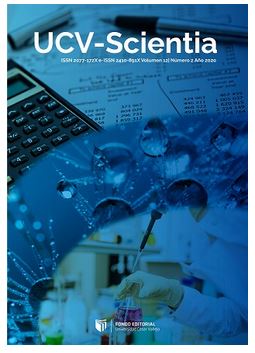Educational Inclusion with Playful Strategies in Social Studies Curricular Adaptations
DOI:
https://doi.org/10.18050/revucv-scientia.v15n2a1Keywords:
educational planning, student adaptation, educational policy, corrective teaching, cultural studiesAbstract
In this article on “Educational Inclusion with Playful Strategies in Curricular Adaptations of Social Studies” addressed the need to improve the effectiveness of curricular adaptations for students with special abilities in the Educational Unit Zenón Vélez Viteri in Salitre, Ecuador. The research adopted an exploratory and descriptive design with a mixed approach, combining quantitative, qualitative, and phenomenological methods. The target population comprised 27 teachers and 730 students, of whom 6 teachers from the Social Sciences area, one from Student Counseling Department, and 41 students participated in the study. The sample was non-probabilistic and was selected by convenience. Data collection was planned prospectively, using semi-structured interviews and participant observation as techniques. The interview guide and the field diary were used as data collection instruments, with interval scales and Likert scale for measurement. The results indicated that, although the majority of teachers implemented curricular adaptations, the application of recreational strategies varied. The research contributes to the educational field by highlighting the importance of inclusion through playful approaches. These findings offer valuable insights for improving pedagogical practices, fostering a more inclusive and effective educational environment. Furthermore, a greater integration of recreational strategies is suggested to optimize the inclusion and effectiveness of curricular adaptations in the field of Social Studies.
References
Candela, Y., y Benavides, J. (2020). Actividades lúdicas en el proceso de enseñanza-aprendizaje de los estudiantes de la básica superior. Rehuso, 5(3), 78-86. https://revistas.utm.edu.ec/index.php/Rehuso/article/view/1684
Chimbo, E., & Pazmino, E. (2011). Las estrategias lúdicas en el desarrollo de la motricidad gruesa de los niños (as) de Primer Año de Educación Básica de los Jardines Fiscales, de la Zona UTE 4, del Distrito Metropolitano de Quito, en el período 2010-2011. Trabajo de Grado. Universidad Central del Ecuador. https://repositorioslatinoamericanos.uchile.cl/handle/2250/2782664
De La Torre Mendoza, R. G., Rodríguez Bravo, J. K., Cusme Solórzano, G. A., & Vera Montesdeoca, F. M. (2022). Adaptaciones curriculares en la asignatura de estudios sociales en estudiantes con trastorno auditivos. Revista Científica sinapsis, 21 (1). https://doi.org/10.37117/s.v21i1.210
Florian, L. (2008). Special or inclusive education: Future trends. British Journal of Special Education, 35(4), 2–7. https://doi.org/10.1111/j.1467-8578.2008.00402.x
Galván, E. (2019). Educación inclusiva, una inversión de futuro. In Educación Inclusiva (Vol. 21, Issue 1, pp. 1–4). https://doi.org/10.33881/0123-8264.hop.21100
Jiménez, Y. (2018). Estrategias lúdicas para la enseñanza-aprendizaje de la matemática a nivel superior. Transforming education for a changing world, 17, 170-179. https://doi.org/10.58909/ad18353224
Márquez, A. A. (2016, mayo 17). Estrategias Inclusivas en el aula: ¿cómo enriquecer las actividades?. https://www.antonioamarquez.com/estrategias-inclusivas-en-el-aula-como/
Mena, E. D., Rengel Hinojosa, K. E., Constante Barragán, M. F., Molina Lozada, M. A., & Riera Montenegro, M. V. (2020). Inclusión educativa en los procesos pedagógicos. Revista Boletín Redipe, 9(10), Article 10. https://doi.org/10.36260/rbr.v9i10.1087
Ministerio de Educación de la Nación. (2019). Educación inclusiva: fundamentos y prácticas para la inclusión. Ministerio de Educación, Cultura, Ciencia y Tecnologia (!ra. Edici, Vol. 1). http://www.bnm.me.gov.ar/giga1/documentos/EL006578.pdf
Monsalve, M., Darío, R., & Mena, S. E. (2016). La Ludica como instrumento para la enseñanza-aprendizaje [Fundación Universitaria Los Libertadores]. In Fundación Universitaria Los Libertadores. https://repository.libertadores.edu.co/bitstream/handle/11371/910/MenaCórdobaSamuelEgidio.pdf?sequence=2&isAllowed=y
Núñez-López, S., Ávila-Palet, J.-E., & Olivares-Olivares, S.-L. (2016). El desarrollo del pensamiento crítico en estudiantes universitarios por medio del Aprendizaje Basado en Problemas. Revista iberoamericana de educación superior, VIII(23), 84-103. https://www.redalyc.org/journal/2991/299152904005/html/
Parra, C. (2011). Educacion inclusiva un modelo de la diversidad humana. Revista: Educacion y Desarrollo Social, 5(1), 139–150. https://dialnet.unirioja.es/servlet/articulo?codigo=5386258
Pavo, M. Á. H., & Patiño, M. G. C. (2020). Aportes de las reformas curriculares a la educación obligatoria en el Ecuador. Revista Scientific, 5(15), 362-383. https://doi.org/10.29394/Scientific.issn.2542-2987.2020.5.15.19.362-383
Romero, E., Escorihuela, Z., & Ramos, A. (2009). La actividad lúdica como estrategia pedagógica en educación inicial. https://www.efdeportes.com/efd131/la-actividad-ludica-en-educacion-inicial.htm
UNESCO. (2021). La inclusión en la educación. https://www.unesco.org/es/education/inclusion
Downloads
Published
How to Cite
Issue
Section
License
Copyright (c) 2024 José Chica Pincay

This work is licensed under a Creative Commons Attribution 4.0 International License.
- Share — copy and redistribute the material in any medium or format
- Adapt — remix, transform, and build upon the material.
- The licensor cannot revoke these freedoms as long as you follow the license terms.
Under the following terms:
-
Attribution — You must give appropriate credit, provide a link to the license, and indicate if changes were made. You may do so in any reasonable manner, but not in any way that suggests the licensor endorses you or your use.
- No additional restrictions — You may not apply legal terms or technological measures that legally restrict others from doing anything the license permits.













